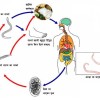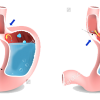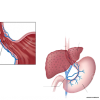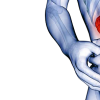Tag: gastrointestinal
-
Appendicitis
Appendicitis is the inflammation of the appendix. Appendix is a small, finger-shaped tubular structure attached to the large intestine located at the right side of lower abdomen. There is no known function of appendix in human body. When infected
-
Abdominal Pain
Pain felt between the ribcage and pelvis is called abdominal pain. It is a very common symptoms experienced by just about everyone at some point of time in their life. Abdominal pain can be generalised over entire abdomen or more commonly localised
-
Black stools
Black stools can be due to bleeding in gastrointestinal (GI) tract or ingestion of certain medications (iron, bismuth) or certain food (blueberries). Black, tarry, sticky and smelly stool is caused by
-
Constipation
Constipation is a common problem related to your bowel movement, when the stool is too hard, difficult to get out and occurs in small amount, less than three times a week. You might have abdominal cramps, may feel
-
Ascariasis
Ascariasis is infestation of humans intestine by roundworm (Ascaris lumbricoides). The roundworm may reside in the guts for 6 to 24 months. The eggs are passed into the stool and under warm, shady, moist conditions
-
Nausea and Vomiting
Nauseas and vomiting are usually manifestation of some underlying disease that are usually non life threatening. Occasionally, it might be an indicator of underlying serious conditions like brain disease, intestinal
-
Vomiting of blood (Hematemesis)
Hematemesis refers to the presence of blood in your vomit or vomiting of pure blood that originates in upper part of your gastrointestinal tract. It needs to be differentiated from spitting blood mixed saliva which
-
Diarrhea
Diarrhea is defined as increased frequency of defection (more than 3 per day) with excessive or abnormally loose consistency. Stool weights more than 200g/day are sometimes used to define diarrhoea but in the absence of abnormal consistency, weight
-
Gasteroesophageal Reflux Disease
Gasteroesophageal reflux disease (GERD) is also known as acid reflux. GERD occurs is when stomach contents leak backwards (called “reflux”) into esophagus and cause symptoms or complications. Reflux is a
-
Esophageal Varices
Esophageal varices are abnormally swollen veins in the lining of the lower esophagus. Most of the time, esophageal varices develop due to obstruction in the portal venous
-
Amoebiasis/Giardiasis
Amoebiasis is an infection of gastrointestinal tract caused by an intestinal parasite called Entamoeba histolytica. It causes dysentery, liver abscess and rarely affects lungs, heart and brain. It occurs everywhere in the world but especially in the
-
Acid Reflux Disease
When we eat food, it travels through the mouth to the food pipe (esophagus) and then to the stomach. Once in the stomach, food cannot come back up into the esophagus under normal conditions because of the presence of the lower esophageal sphincter
-
Peptic Ulcer Disease
Peptic Ulcer Diseases (PUD) are conditions where the lining of the stomach and the duodenum (first part of the small intestine) are damaged leading to the formation of open sores. The stomach and duodenum are in
-
Hookworm Infestation
Hookworm infestation is a parasitic disease of humans caused by one of the two organisms- Ancylostoma duodenale and Necator americanus. It is the second most common helminthic infection in developing world. Hookworms are found in soil contaminated















